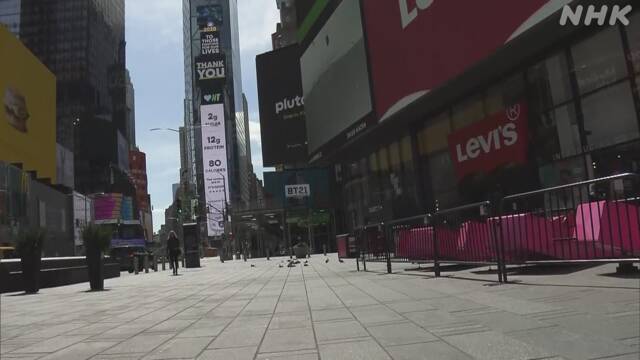A year after the United States declared a state of emergency following the rapid spread of the new coronavirus, financial distress spread among young people and seriously affected their mental health. It is becoming clear that it is.
In the United States, on March 13, last year, President Trump declared a state of emergency, and the authority of each state took measures such as going out restrictions and school closures.
A year later, as vaccination progresses, movements toward the resumption of full-scale economic activity have begun, but it has become clear that there are serious impacts among young people.
It has been pointed out that many young people work in the service industry, where business was restricted as an infection control measure, and that financial distress is spreading among young people, such as losing their jobs in the past year.
In addition, mental health is also affected, and according to a survey by the US CDC = Centers for Disease Control and Prevention, 18 to 29 years old who answered that they had symptoms of anxiety or depression in the past 7 days were in April last year. From February to May, it was 46.8%, but from February to March, it increased to 55.4%.
This is thought to be due to the fact that the percentage is higher than in other age groups, and that there is less social involvement such as financial difficulties and continued online lessons.
Regarding this situation, the local media has called for support by comparing the insurmountable wall "pandemic wall" in front of young people due to growing anxiety about the future. I will.
The woman who left New York
Cynthia Pierce, 29 years old.
I left New York on the 1st of this month.
Originally from Florida, she found a clerical job for a material maker and came to New York in the summer.
I go to the office in Manhattan and go to the gym three days a week.
On weekends, I used to eat at restaurants and enjoy sightseeing with my friends.
However, when I said "more from now on," I was hit by the spread of the new coronavirus.
The office closed in March, and he says he can no longer go to the gym.
"I was watching millions of people in New York, but suddenly they all became lonely. I too," Pierce recalled.
Mr. Pierce decided to leave New York because the rent was also a burden.
In the future, he says he wants to stay in a passenger car for a while and spend about half a year.
There are many people in the United States who live in such cars, also called "nomads", which means nomads, and recently movies have been made and it has become a hot topic.
Mr. Pierce removed the back seat of the car and installed a wooden table-like stand in the empty space.
A mattress to sleep on is placed on the table, and clothes, cooking utensils, seasonings, etc. are placed underneath.
Mr. Pierce, who had experienced such a life before, said that he was looking forward to meeting as many people as possible face-to-face.
On the day he left New York, Pierce said that everyone would face the "pandemic wall," the wall that was confronted by the spread of the infection, and said, "I have changed everything from my daily life. I think we have no choice but to move forward to overcome it. "
California's hard-working students
Joselin Romero is a Mexican-born immigrant, 25 years old.
While working to cover my living and tuition, I attend a two-year public university in the suburbs of Los Angeles.
It is said that the spread of the new coronavirus has forced the economy into a difficult situation.
Romero leaves the apartment where he and his younger brother live together at 5 am every morning.
The first stop is the supermarket where you work.
I am in charge of cash registers.
Work is 8 hours from 6:30 am to 2:30 pm.
I come home late at night, so I spend my time studying until my next job.
Romero's major is theater.
The second place of work is a coffee shop.
Work is 6 hours from 4 pm to 10 pm.
Before the spread of the infection, I was able to work 8 hours a day, 40 hours a week at this store and earn enough income.
It is said that he was assigned a responsible post and was treated well.
However, the spread of the infection forced the reduction of working hours, and the income also decreased.
I had no choice but to take on two jobs.
Now, Romero's daily working hours are as high as 14 hours.
Mr. Romero said, "The financial support from the university side is insufficient. It's about" buy food with this. Do your best after that. "So, I have to make ends meet both financially and academically. No. For me, a pandemic wall is a kind of anxiety, which is completely different from the anxiety I felt before the spread of the infection. "
Romero's dream is to work in the entertainment industry, but she's starting to think that dream may not come true.
In addition to theater, I also started studying sociology.
Regarding the reason, Romero said, "I used to think that I would study what I wanted to do, but now I think that I have to study what I need to make money so that I will not feel anxious about the future." I'm talking to you.
In addition, Romero says that the mentally difficult situation continues.
“As I continued to live at home, I had a mental impact. It was very difficult to concentrate on what I should do so that I wouldn't be lonely and crazy. It's different from actually meeting, and now it feels difficult to return to the normal of meeting people normally, and it's a pandemic wall. "

